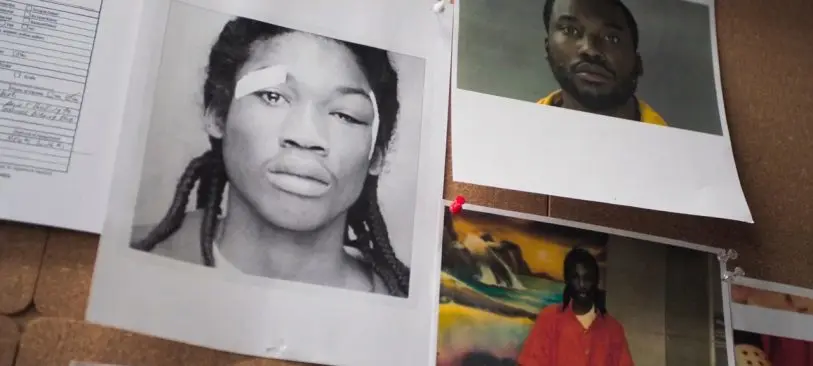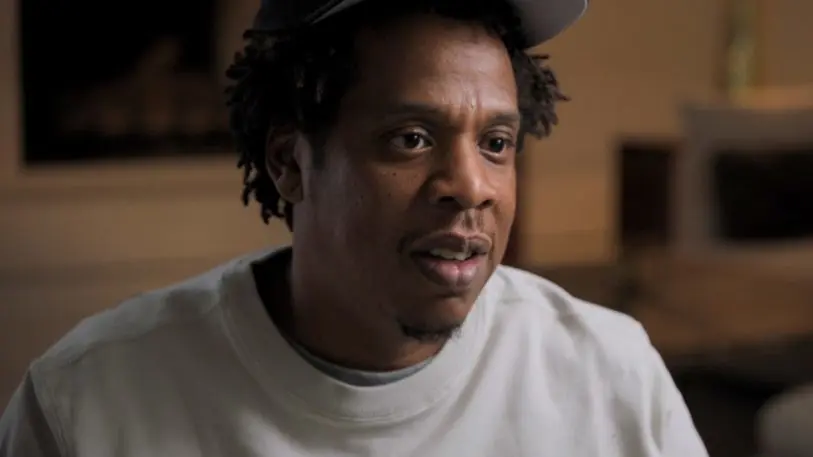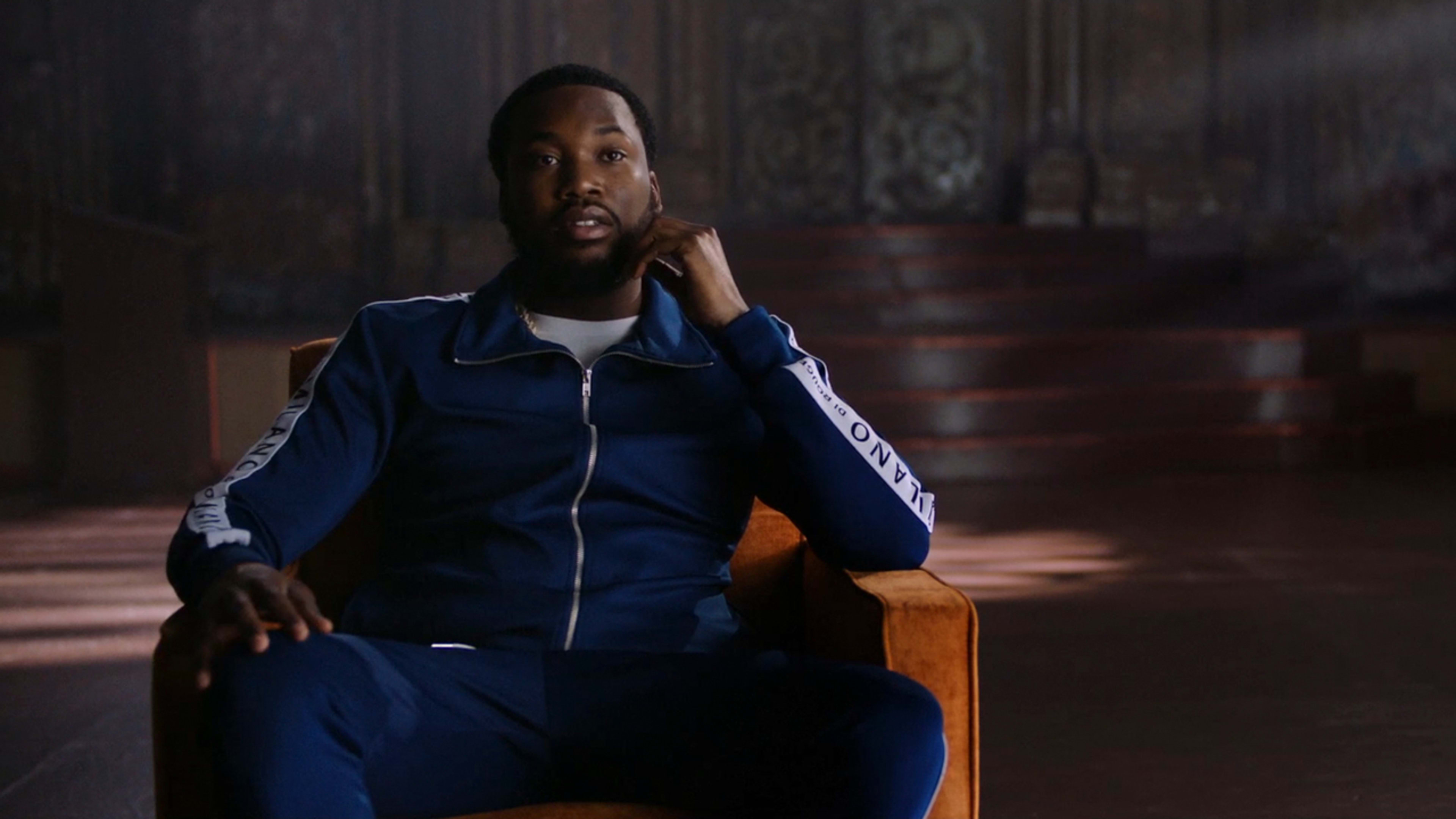The topic of mass incarceration often leads to the staggering statistic that there are currently 2.2. million incarnated adults in the U.S., more than in any country in the world.
But what’s not being discussed as much is mass supervision. According to the Prison Policy Initiative, there are currently 4.5 million adults in the U.S. who are on probation or parole, which, on paper, should be better than prison.
But as Philadelphia rapper Meek Mill can attest to, it becomes its own version of hell.
Amazon Prime’s docuseries Free Meek chronicles Mill’s exhaustive case starting with an arrest and conviction when he was 19 (he’s now 32) that put him on probation for 10 years. There are parts of his case that are depressingly common: a black man being sent to prison on trumped-up or outright fallacious charges. But then there are elements to the story that are highly unorthodox—so much so that Mill’s defense team brought on private investigative firm Quest Research and Investigations.
We caught up with one of QRI’s principals to understand how they did their work that’s depicted in Free Meek. Although Mill isn’t completely in the clear yet, he might not be out on bail if not for QRI. By thinking past the parameters of their original assignment, QRI unearthed new revelations that have put Mill on the fast track toward freedom, and, hopefully, bring about broader change.
The criminal justice nonprofit’s best defense
QRI was founded in 2010 and is led by former journalist Tyler Maroney and labor activist and attorney Luke Brindle-Khym.
It targets cases that support the public interest, so QRI often works with criminal justice reform-minded nonprofits. The Innocence Project connected QRI with the producers of HBO’s docuseries The Case Against Adnan Syed to try to find new leads and angles to the true-crime story that had already been carefully dissected by the team behind the hit podcast Serial, not to mention amateur sleuths on the internet.
In the Mill case, Michael Rubin, CEO of e-commerce company Kynetic (which owns Fanatics, ShopRunner, and Rue La La) and partner of the Philadelphia 76ers, put QRI together with the nonprofit Justice League after learning of Meek’s fate.
“We explicitly seek out cases that allow us to feel like we are contributing to the public good,” Maroney says. “Doing investigations to exonerate the wrongly convicted, that’s part and parcel of a larger understanding of the criminal justice system.”

The case against Judge Genece Brinkley
QRI began to explore Mill’s case in November 2017 when he was imprisoned again after a minor parole violation. Mill’s defense team felt that Judge Genece Brinkley, who had been assigned to his case from the beginning, was unusually harsh in doling out prison time for parole infractions and too invested in Mill’s life overall. In 2012, Mill was in the middle of a promo tour for his album Dreams and Nightmares, but when Superstorm Sandy hit New York, his travel plans were derailed—a technical violation of his probation. Instead of just chalking it up to an act of God, Brinkley barred Mill from completing his tour, costing him a reported $7 million to $8 million. In court, Brinkley would openly bash Mill’s management team (Jay Z’s Roc Nation), and, according to Mill, once asked him to her private chambers to request he do a remix of Boyz II Men’s classic “On Bended Knee” and give her a shout out.
In Free Meek, Brinkley’s own lawyer A. Charles Peruto Jr. is seen avidly defending his client throughout the docuseries. When Mill’s team requested a new trial and sought bail last year, Brinkley refused even to entertain the idea. On camera, Peruto backed up Brinkley’s decision, but with the cameras off and his mic still live in episode five, Peruto is heard saying, “Let me tell you something: That was hard to do, because defending this judge is now becoming . . . . Why doesn’t she just grant this fucking thing? And she looks fucking awful. I don’t know why she’s got a bug up her ass about this guy.”
“The assumption was that there was some conflict that Judge Genece Brinkley had and there was some obsession that she had with him,” Maroney says. “So we spent months looking into that, and we learned a lot about her and her background and her potential conflicts and her issues involving integrity.”
For example, QRI learned of Brinkley’s highly litigious personal life, which included dozens of civil lawsuits relating to her position as a landlord in the properties that she owns. The litigants against her frequently claimed that she used her status as a judge as a means for intimidation.
“But at the end of the day, that was a bit of a sideshow,” Maroney says. “It was not really the case that needed to be made for Meek.”
Instead, QRI shifted their focus to what got Mill into the system in the first place: his arrest when he was 19.
Back to square one
According to Mill’s account, on January 24, 2007, he was leaving his cousin’s house to run an errand when police descended on him. He was carrying a gun for protection but immediately put it down and put his hands up. Police brutally beat and handcuffed him, used his head as a battering ram to break down the door, and proceeded to raid Mill’s cousin’s house.
In episode four of Free Meek, Mill’s cousins claim they heard a cop say “bingo” during their raid only to find $30,000 missing from their house. “That’s when he found the money,” said Ikeem Parker, Mill’s cousin. “He got what he came for. They were taking the money out of our pockets and putting it in their pockets.” However, former officer Reggie Graham remembered things differently. According to him, he saw Mill selling crack the day before, which gave him the search warrant he needed. Graham also says that Mill pointed his gun at the officers, which is why they tackled him. He somehow racked up 19 counts from the incident, and when the case went to trial, Graham was the only witness to testify for the prosecution, so everything hinged on his recollection.
Mill was found guilty of 7 out the 19 charges and sentenced to 11 to 23 months in jail and 10 years probation.
But there were way too many holes and red flags for QRI to ignore: Graham claimed Mill had crack on him at the time, yet there was no evidence sent to a lab or presented in court. Graham claimed he pointed a gun at them, yet conventional wisdom would lead anyone to assume that if a black man pointed a gun at a police officer, said black man would be shot on sight.

There was an affidavit that the police officers that night had to sign basically saying they did indeed witness Mill engaging in criminal activity.
“We obsessively looked at, in otherwise circumstances, a boring document,” Maroney says.
Looking past the legalese and cop speak, Maroney says they noticed what seemed to be a minor discrepancy: They had documentation proving Gibson was on the scene that night, yet, for whatever reason, he wasn’t on an internal affairs report that listed the officers who were present when Mill was arrested.
“In some cases it’s not necessarily a result of just outright corruption and wrongdoing, but it’s just sloppiness, misconduct, stupidity, not understanding the rules and policies,” Maroney says. “In this case, the reason it was effective for us is that not only do we find out that the arresting officer had been investigated himself by the internal affairs department [and placed on the Do Not Call list], but it was investigated by the FBI.”
QRI got Gibson to tell his version of what happened that night, and, in a sworn affidavit, Gibson refuted Graham’s entire story. With Walker and Gibson’s affidavits and the prior investigation into Graham’s conduct, Mill’s team had the basis to file a post-conviction relief act petition “based on the fact that Meek appears to have been convicted due to perjured testimony, he is entitled to have that conviction vacated,” said Jordan Siev, one of Meek’s attorneys, in episode five of Free Meek. It proved to be a major window of hope that would’ve never opened had QRI not looked past Brinkley’s behavior and plucked at the loose ends in Mill’s past case.
“I think [it’s] obsession and neuroses,” Maroney says of the QRI team’s work ethic.”It sounds like a joke, but it’s true. And the desire not to take no for an answer.”
“It’s the kind of thinking where we’re not just doing the four things the client asks us to do, but we’re making a real effort,” he continues. “Like a good investigative journalist or any journalist, it’s not telling the story that the company is trying to pitch you, but finding the narrative that is the closest to the truth.”
Building a better system
Judge Brinkley initially denied Mill a new trial and refused to recuse herself of the case. However, the Pennsylvania Superior Court eventually stepped in and granted Mill all of the above. He’s currently awaiting a status hearing on August 27 to find out if his 2008 gun and drug conviction will be retired.
Mill’s case has been a drawn-out saga, but one that has shone an even brighter spotlight on the gross misuses of power to the detriment of disenfranchised communities. The international #FreeMeek movement and the energy around the outcry was eventually channeled into Mill’s organization Reform Alliance. Since being released on bail in 2018, he has dedicated his platform to attacking the broken system that continues to imprison black and brown men at alarming rates.
A docuseries like Free Meek will only help to amplify that message.
“These are issues that we are aware of and we think about in our investigative work, and that matters to us,” Maroney says. “People have been coming to us and saying, ‘Our client is not Meek Mill, but has been dinged for probation violations multiple times. What can you do to help?’ And we now, in many ways, have a kind of recipe for that. We have a handbook for how we might approach those cases. And so we’re trying to build on that work.”
Recognize your brand’s excellence by applying to this year’s Brands That Matter Awards before the early-rate deadline, May 3.
